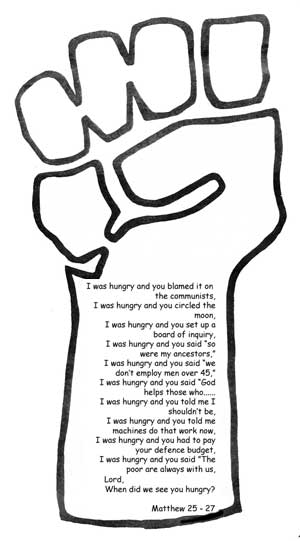
 |
Online
Archive
|
| Issue 6 - June 1972 |
| Stoke Newington 8 |
 In
August last year, police took 6 people from a flat in Stoke Newington,
London.
They were charged with "conspiracy to cause explosions" and
possession of guns and explosives. Two more people from North London
are now also on the 'conspiracy' charge. Three of the 8 were put on
bail and the rest were in prison for 9 months before their trial came
up on 1 June. In prison 9 months WITHOUT TRIAL! Remember Jake Prescott
and Ian Purdie? They were tried last November on the same type of charge.
The police didn't manage to set up Purdie, but they got Prescott convicted
on hardly any evidence ... he's now doing 15 years for nothing! In
August last year, police took 6 people from a flat in Stoke Newington,
London.
They were charged with "conspiracy to cause explosions" and
possession of guns and explosives. Two more people from North London
are now also on the 'conspiracy' charge. Three of the 8 were put on
bail and the rest were in prison for 9 months before their trial came
up on 1 June. In prison 9 months WITHOUT TRIAL! Remember Jake Prescott
and Ian Purdie? They were tried last November on the same type of charge.
The police didn't manage to set up Purdie, but they got Prescott convicted
on hardly any evidence ... he's now doing 15 years for nothing!
But what is this 'conspiracy' crime they have all been charged under? In criminal law, a conspiracy is an agreement between two or more persons to do something lawful by unlawful means or to do something unlawful. For the crime to be complete nothing has to be put into effect since it is the agreement itself which is the crime. Although two persons at least must obviously be involved, the second or others need not be brought before a court, since they may be deemed to be 'unknown'. It isn't even necessary for the prosecution to prove that the defendants know one another. It is an easy charge to prove since a) the jury need only infer guilt from the evidence before them, and b) because of the laws of evidence peculiar to conspiracy, whereby the prosecution is able to put forward a whole mass of material that would otherwise be inadmissible in a criminal court. Originally, when conspiracy was introduced in the 13th century, it was a remedy against those who made false accusations in court. By the 17th century it had been expanded to the extent that it was itself a crime. It quickly developed to become a favourite legal weapon in the state's arsenal since, in addition to the above reasons, as it is a common law offence, it can be brought for anything - even for an offence established neither by Parliament nor in law. Its use has developed with particular historical epochs. In the 17th century, it was used extensively against the political enemies of the monarchy, and in the 19th, it became a key weapon against workers actively engaged in class struggle. Today, it is used more extensively than ever. The police have understood what the state has always known, namely, that in a situation where it is impossible to prove the commission of an actual crime, it is possible to 'prove' conspiracy. And since the sentence is unlimited (except where it is determined by statute) it can therefore often be greater than for the substantive offence, which suits them fine. The trial of the Stoke Newington 8, has a history very similar to the political trials of the right wing / fascist dictatorships of Spain and some Latin American countries. For months before the trial, the defence has been hampered and hindered from being as effective as it could be, by the Home Office and unsympathetic lawyers. Two months ago, 20 Queens Councillors were approached concerning the defence of 7 of the 8 accused. One of the accused had managed to find a QC. All of these QCs said they were too busy to do it. That not one of these offered his services to the defence is very, very unusual, and a lot can be read into it. With no professional people willing to defend them, the load fell onto friends and supporters, who offered their help as McKensies Advisors (unqualified representatives). But then the Home Office refused permission to allow these representatives to see the defendants in prison, even though the Law Society (representative body of the legal profession) said they should be allowed to. So now, not only does the defence have next to no qualified help, but the unqualified helpers are being hindered. The prosecution, of course, has none of these problems. It has all the legal expertise it needs. Over the period of the trial, we are all going to be subjected to the political bias of the mass media - making comments on the accusations levelled at the defendants. The 8 have already been presumed guilty by the more sensational and widely read newspapers. The heinous crime that they are being accused of - that of destroying property - is one that strikes right at the roots of reaction amongst those who believe in wealth.
|